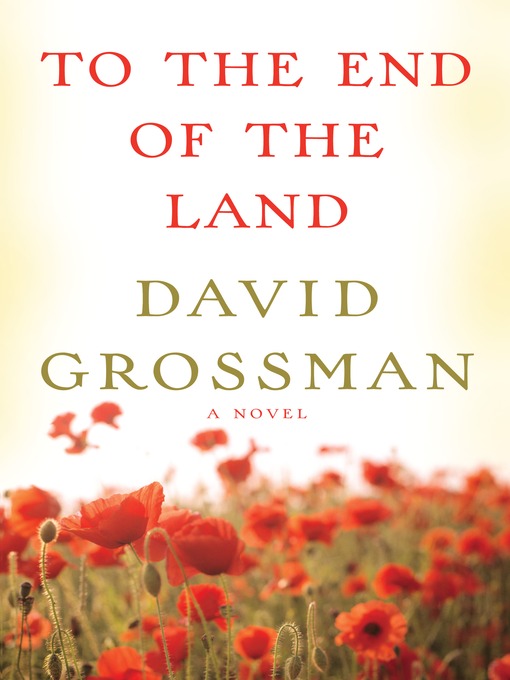 Each day leading up to the March 10 announcement of the 2010 NBCC award winners, Critical Mass highlights one of the thirty-one finalists (to read other entries in the series, click here). Today, NBCC board member Eric Banks discusses fiction finalist David Grossman's To the End of the Land, translated by Jessica Cohen (Knopf).
Each day leading up to the March 10 announcement of the 2010 NBCC award winners, Critical Mass highlights one of the thirty-one finalists (to read other entries in the series, click here). Today, NBCC board member Eric Banks discusses fiction finalist David Grossman's To the End of the Land, translated by Jessica Cohen (Knopf).
David Grossman’s remarkable tour-de-force To the End of the Land ostensibly takes place in the year 2000 and at the beginning of the second intifada. With the emergency calling forth yet another military campaign, a young Israeli named Ofer who has just completed his three-year-term of service opts to re-up his enlistment for an additional 28-day stint of duty. His distraught mother, Ora, has been planning a hiking trip with him through Galilee and frantically rehearses in her mind the horror of receiving a knock on her door from the three-person “notifier” team that will announce her youngest son has become a casualty of the latest security initiative. In a quixotic bit of magical thinking, she decides that to evade that fate, she’ll simply refuse to acquiesce and chooses to become a “notifier-refusenik.” With her son’s backpack and her own, she sets out herself to escape into her own 28-day trip to the Israeli wilds.
She isn’t alone; she’ll be accompanied by Ofer’s biological father, Avram, whose own experience as a soldier has left him a mangled hull of a human being following his capture and torture as a POW during the 1973 Arab-Israeli War (aka the Yom Kippur War, or the Ramadan War, depending on your geopolitical perspective). Though he conceived Ofer, he has sedulously refused to speak of his son, who is raised by Ora and her now-estranged lawyer husband, who unlike her has fled the psychic and literal war zone of Palestine for South America. Ora’s unlikely traveling partner is half hostage to her quixotic plan to cheat the apparently inevitable, but he will be a listening partner to her lengthy attempt to narrate the life of their son, telling the story of his life (and their own) that he has been unable to face himself.
It’s impossible to separate out Ora’s own state of mind from the public anguish of life during wartime in Israel, which is to say life as such. Nor is there an easy way to divide the private and intimate world of family from the martial demands of a state that cyclically erodes that barrier in ongoing violence. To the End of the Land, translated with quiet aplomb by Jessica Cohen, is a fierce story of a sort of Everywoman who in effect narrates the history of Israel through three conflicts—the 1967 war, the war of 1973, and the war that threatens the identity not just of her son but of everyone around her in 2000 (though that last date might stand in effect for simply “the present”). Titled in Hebrew A Woman Escaping News, the novel is Grossman’s most daring writing to date. Not only does he fully inhabit his character Ora, he deftly shifts from her desperate mental spaces to hauntingly lovely descriptions of the Galilee countryside. When the truth slowly emerges about the fractured human landscape of Ora, Avram, and the absent Ilan, it does so with a literary force rarely encountered. Along with Sami, Ora’s Arab driver, they serve as emblems of the conflict, but they are much more than ciphers—their painful but poignant experiences, in Grossman’s hands, feel sadly but magnificently concrete.
Ora herself knows that there’s no real escape into Galilee, and there’s no escape from Israel. “She knew full well from her experience with Adam, who had been out of the army for three years, that they don’t really come back. Not like they were before. And that boy he used to be had been lost to her forever the moment he was nationalized—lost to himself, too.” Grossman has been a vocal critic of Israeli foreign and domestic policy and has spoken of writing as a way to avoid the paralysis of despair of the never-ending conflict. As he writes in a postscript to the novel, when he was writing it in 2006, he received news that his own son had been killed in the Israeli invasion of Lebanon. “Most of it was already written. What changed, above all, was the echo of the reality in which the final draft was written.” If that reality of the book’s writing can’t be avoided in its reading, the brittle poignancy, the hard-won dignity, of To the End of the Land emerges on every one of its pages.
An excerpt from To the End of the Land can be read here, via the New York Review of Books. George Packer's New Yorker profile of David Grossman can be accessed here.


